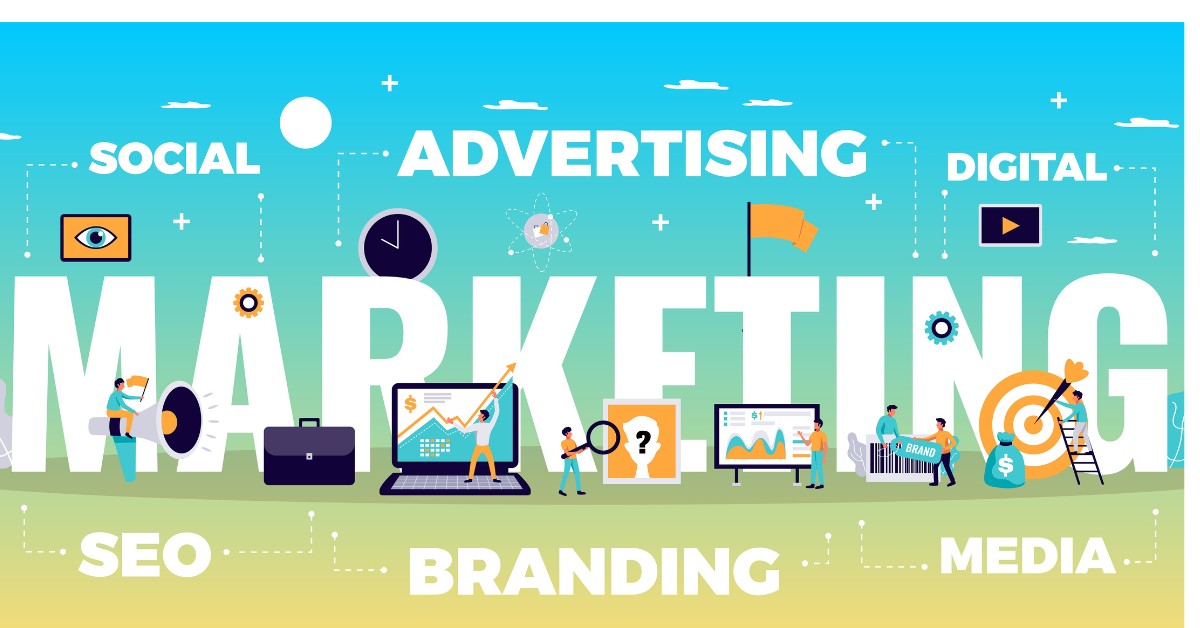Introduction:
Digital marketing and personal branding is now very crucial in the fast-paced digital environment of today. Your personal brand determines how others view you online, whether you are an influencer trying to really connect with followers, a freelancer trying to stand out in a crowded market, or an entrepreneur starting a new business. Your personal brand is your story, values, and unique qualities that make you memorable, not just a logo or catchphrase.
Given so many individuals, building an online presence and digital marketing personal branding that really captures who you are—and that appeals to the appropriate audience—requires careful thought. Digital marketing comes in here. Digital marketing tools and strategies present many chances to highlight your experience, attract your target audience, and create enduring relationships based on credibility. Where do you start, though, with so many sites and techniques at hand?
This comprehensive tutorial will guide you through practical techniques that will enable you to effectively apply digital marketing for personal branding. This book will provide you the knowledge you need to get going from using social media and creating captivating material to optimizing for SEO and measuring your development with analytics. We break down every step to make the process clear, simple, and actionable, enabling you to build a personal brand that resonates with you and captures the interest of those who matter most.

Understanding personal branding and why it matters
Personal branding extends to your LinkedIn bio or your social network page. Your special combination of personality, knowledge, and abilities will help you to stand out among a sea of internet voices. Personal branding is really your reputation—how others view you, what they connect with your name, and what they feel when they think of you. Let’s dissect what personal branding means today, why it’s important, and how you could use it to gain credibility and trust with your audience.
Definition of Personal Branding
Personal branding in the digital age is mostly about your conscious presentation of yourself. It’s about presenting yourself in a way that connects with people and emphasizes your special value, not only about appearances. Personal branding covers your voice tone, the subjects you cover, and the knowledge you bring to bear. A health influencer might be known for empathy, mindfulness, and self-care, while a tech entrepreneur might concentrate their brand on invention, openness, and leadership. Personal brands tell audiences what values you uphold and what to expect.
Why personal branding is important
- It builds credibility and trust.
Particularly in a time when everyone can create an online presence, a strong personal brand builds confidence. People are more likely to trust you as a dependable information source when they find consistent, worthwhile material from you. This trust can open fresh prospects, alliances, and expansion throughout time.
- Separates You from the Competition
In the digital realm, where there are so many voices, a distinctive personal brand distinguishes you. Being real and presenting your original viewpoint can help draw the correct audience since you are providing something distinct from what is already available.
- Generates awareness.
A strong personal brand will enable you to be identifiable in your field of work. When you consistently provide insightful analysis and narratives, your audience begins to remember you and associate your name with specific knowledge or style. As others start to view you as an authority in your profession, recognition is powerful; it might result in referrals, job opportunities, or even speaking engagements.
SEO Tips for Personal Branding
For the right audience to find you, you must optimize your personal brand for search engines. Here are some effective SEO tips to boost your visibility:
- Highlight keywords in your bios.
Think about the terms that best describe your expertise and goals. Use these keywords in your social media bios, LinkedIn summary, and website to help search engines understand what your brand is about. For example, if you’re a digital marketing consultant, use phrases like “digital marketing expert,” “SEO strategist,” or “content marketing specialist” in your profiles. - Create a Personal Website
A personal website serves as the central hub for your brand. Optimize your website’s homepage, bio, and blog posts with relevant keywords that reflect your field. This can help improve your ranking in search results, making it easier for people to find you when searching for expertise in your area. - Optimize your content for search engines.
Regularly publishing blog posts or videos that answer common questions in your field is a fantastic way to build authority and increase visibility. Use tools like Google Keyword Planner or Ahrefs to find popular keywords related to your niche and include these naturally in your content. - Use consistent naming and screenshots across platforms.
Consistency helps search engines and users recognize your brand more easily. Use the same name format (e.g., “Alex Smith” instead of alternating between “Alex Smith” and “A. Smith”) and the same profile photo on all platforms to strengthen your online presence.
By implementing these SEO practices, you’ll improve your chances of ranking higher in search results, ultimately making it easier for people to discover and connect with your brand.
Understanding the importance of personal branding and the role of SEO sets a strong foundation for the rest of your journey. Remember, building a personal brand takes time and consistency, but the rewards—trust, credibility, and recognition—make it worth the effort.
2. The role of digital marketing in personal branding
Regarding developing a personal brand, digital marketing is akin to having a ready-made toolset at hand. Every digital marketing strategy presents many approaches to interact with your target market, highlight your knowledge, and increase your online profile. Using these tools deliberately will help you build a distinctive brand whether it comes to social networking, content development, or email correspondence. Let’s look at how to use digital marketing to present your business to the proper target market.

Social Media Marketing
Social media is one of the most powerful tools for building a personal brand. Each platform has its own style and audience, so it’s essential to choose the right ones for your brand and tailor your content accordingly.
- Choosing the right platforms
Not every social media platform will be the perfect fit for your personal brand. Start by identifying where your target audience spends most of their time:- LinkedIn is ideal for professionals, thought leaders, and anyone looking to build credibility in their industry.
- Instagram is highly visual, making it a beneficial choice for creatives, entrepreneurs, and lifestyle brands.
- Twitter is excellent for quick insights, industry news, and connecting with like-minded professionals.
- YouTube is perfect for video content and can help establish authority through tutorials, insights, and storytelling.
- Tailoring content for each platform
Adapt your content style to fit each platform. For example:- LinkedIn posts should be professional, focusing on insights and accomplishments.
- Instagram thrives on behind-the-scenes stories, personal reflections, and visual content like photos and infographics.
- Short, engaging content, such as tips, quick updates, and trending topics, works well on Twitter.
- YouTube allows for longer, in-depth videos, making it a perfect place for tutorials, interviews, and thought leadership pieces.
Tip: Schedule regular posts to stay top of mind. Using a social media scheduler like Buffer or Hootsuite can help you plan and maintain a consistent posting schedule.
Content Marketing
Content marketing can powerfully accomplish sharing your knowledge, establishing authority, and developing trust with your audience. Offering value through material helps you to position yourself as an authority and offer people cause to interact with your business.
- Maintaining a blog
Blogging lets you communicate in-depth expertise on subjects related to your line of work. Select topics that appeal to your readers, respond to their inquiries, or solve often occurring problems. Blog entries not only highlight your knowledge but also help with SEO, therefore increasing your internet presence and facilitating finding you.
- Podcasting
Podcasting is a great way to establish a personal relationship with your listeners. On a podcast, you can share your ideas, conduct interviews, and delve into subjects that are dear to you. Moreover, listeners relate better to a voice, which strengthens their relationship.
- Video Materials
Videos greatly enhance the communication of your brand message because they are engaging and memorable. Popular venues for video material are YouTube, Instagram Stories, and TikHub. Showcase your daily schedule, discuss ideas, or offer tutorials with videos. Video material will help your brand be more relevant and personalized.
Pro Tip: Repurpose content to maximize its reach. For example, turn a blog post into a podcast episode, or take snippets from a YouTube video and share them on Instagram or Twitter. This saves time and keeps your content fresh across platforms.
Email Marketing
Email marketing is one of the most direct ways to connect with your audience. Building an email list allows you to maintain communication with your followers, keep them updated, and even share exclusive content or offers.
- Building an Email List: Begin by creating a lead magnet, such as a free ebook, checklist, or webinar, to encourage sign-ups. A lead magnet provides value upfront, giving people a reason to subscribe to your email list.
- Creating a newsletter
Send regular newsletters to keep your audience engaged. Your newsletter could include tips, industry news, personal stories, or a roundup of your latest content. A well-crafted newsletter helps you stay relevant and keeps your audience coming back for more. - Using Segmentation
Segmentation involves dividing your audience into groups based on their interests or behaviors. For example, if your brand covers both marketing and entrepreneurship, you might have different segments for each topic. Segmentation allows you to send more personalized content, which increases engagement and strengthens your relationship with your audience.
Tip: Consistency is key with email marketing. Decide on a schedule, whether it’s weekly, biweekly, or monthly, and stick to it. This helps build trust and sets the expectation that your subscribers will hear from you regularly.
Consistency in branding elements
To create a strong and recognizable personal brand, it’s essential to use consistent branding elements across all your platforms. This helps people easily identify your content, whether they’re seeing it on LinkedIn, Instagram, or your website.
- Even a simple, minimalist logo can enhance the professional appearance of your brand. It could be your initials, a unique icon, or a simple symbol that represents your brand’s identity. Use this logo across all your profiles and on your website.
- Tagline
A short, memorable tagline helps clarify what your brand stands for. It should communicate your core message and give your audience a quick sense of your expertise. For example, if you’re a business coach, your tagline could be something like, “Helping entrepreneurs reach new heights.” - Color Palette
Choose a color palette that reflects your brand personality. Consistently using the same colors across your profiles, website, and content creates a cohesive look and helps people recognize your brand at a glance. - Tone of Voice
Whether it’s friendly, authoritative, or inspirational, your tone of voice should match your brand’s identity. If you’re positioning yourself as a friendly, approachable expert, use a conversational tone. If your brand is more formal, keep your tone polished and professional.
Pro Tip: Consistency isn’t just about looks; it’s also about the message. Make sure your content aligns with your brand values and goals. This builds trust and helps your audience understand what you stand for.
By leveraging digital marketing strategies such as social media, content creation, and email marketing, you can
Be well-equipped to establish a personal brand that resonates with your audience. And by keeping your branding elements consistent, you’ll create a cohesive and memorable presence that builds recognition and trust.
How to Define Your Personal Brand
To build a strong personal brand, you need to know what makes you unique. Here’s a step-by-step guide:
- Identify Your Niche: Choose an area where you have expertise and that aligns with your interests.
- Define Your Target Audience: Knowing your audience helps you create relevant and impactful content.
- Craft Your Brand Story: A strong brand story shares your journey and mission, helping people connect with you on a personal level.
Tip: Use tools like Google Analytics and social media insights to see what content resonates with your audience. This data-driven approach helps you fine-tune your brand voice and messaging.
Developing a digital marketing strategy for personal branding
Creating a structured plan is key. Here’s how to set up your strategy:
- Set Clear Goals: Define what success looks like for you (e.g., increased followers, website visits, or collaboration opportunities).
- Choose Marketing Channels: Focus on the channels where your audience is most active.
- Plan Your Content: A content calendar ensures that you post consistently and stay relevant.
SEO Strategy: Use keyword research tools (like Google Keyword Planner) to find high-ranking keywords relevant to your niche. Integrate these into your content to improve search engine ranking.
Using social media to build and promote your personal brand.
Social media is essential for establishing and promoting your personal brand. Here’s a breakdown of the top platforms:
- Instagram: Best for visuals and connecting with younger audiences.
- LinkedIn: The go-to platform for networking and showcasing your professional achievements.
- Twitter: Great for sharing quick insights and industry updates.
Tip: Post consistently, engage with followers, and use a mix of personal and professional content to keep your profile authentic.
Here are some tips for creating content that highlights your expertise.
Content helps people see your skills and knowledge in action. Here are some effective ways to create content:
- Start a blog or YouTube channel: Share tutorials, industry insights, and personal stories.
- Guest posting: Contributing to other platforms expands your reach.
- Create Downloadable Resources: E-books, guides, and checklists are valuable content assets.
SEO Tips for Content: Write long-form blog posts with targeted keywords, headings, and internal links to increase time on page and boost SEO.
Building Credibility Through Reviews and Testimonials
Social proof is powerful. Encourage your clients or colleagues to leave reviews or endorsements on LinkedIn or your website. Testimonials show that others trust your work, which builds credibility.
Tip: Showcase these testimonials on your homepage or create a dedicated “Testimonials” page to highlight them.
Tracking Your Digital Marketing Performance
Analytics helps you see what’s working and what needs improvement:
- Google Analytics: Track your website traffic, user behavior, and referral sources.
- Use platform-specific analytics to monitor engagement and follower growth in social media insights.
- SEO Tools: Tools like SEMrush and Ahrefs help track your keyword rankings.
Tip: Set monthly goals for metrics like website traffic, social media engagement, and lead generation. Use these goals to stay motivated and measure your progress.
Building an email list for personal branding.
An email list gives you direct access to your audience, making it a powerful tool for building a personal brand. Here’s how to get started:
- Offer Free Resources: Create a valuable freebie, like an e-book or checklist, to encourage sign-ups.
- Segment Your Audience: Group your email list into segments to send targeted content.
- Consistency is Key: Send regular newsletters with useful content to keep your audience engaged.
SEO Advantage: A growing email list improves your website’s authority, signaling relevance to search engines.
Networking and collaborating to expand your reach
Networking is crucial for digital marketing and personal branding as it provides access to new opportunities.
- Join Online Communities: Platforms like Facebook groups and LinkedIn communities are great places to connect.
- Attend Virtual Events: Webinars and virtual conferences are excellent for meeting people in your industry.
- Collaborate with Others: Partnering with influencers or experts in your niche can expand your audience.
Tip: Always bring value to networking interactions. Offer advice, share insights, and be open to learning from others.
Conclusion: Digital marketing and personal branding
Although building a personal brand requires time and work, with the correct digital marketing techniques, you can produce a brand that really captures who you are. Begin by taking small, consistent steps such as sharing valuable content, engaging with your audience, and speaking your truth. Your brand will develop over time and draw the proper people and possibilities.
Personal branding is about being real and presenting your actual selves. Start now and observe how your brand transforms into something powerful and unforgettable.
FAQs about digital marketing and personal branding.
Q1: How often should I post on social media to grow my personal brand?
Consistency is more important than frequency. Aim to do it at least 3–4 times a week, but stick to a schedule you can maintain.
Q2: How can I improve my personal brand’s SEO?
Use relevant keywords, create high-quality content, and optimize your website for search engines. Building backlinks by guest posting on reputable sites also helps.
Q3: Do I need a website for personal branding?
While social media can serve as your platform, a personal website provides more control and credibility. It’s also an ideal place to house a portfolio, blog, and testimonials.
Q4: How do I know if my digital marketing efforts are working?
Track metrics like website traffic, social media engagement, and email sign-ups. Adjust your strategy based on which tactics perform best.
Q5: What if I’m camera-shy or don’t want to share personal details?
You don’t have to be on camera or share your entire life to build a personal brand. Focus on your expertise and share insights and valuable content that resonates with your audience.

